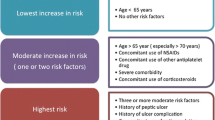Aspirin is widely used for its antiplatelet activity, but it harbors a risk of severe adverse gastrointestinal effects, such as bleeding and perforation, especially in elderly people. Our aim to assess the prevalence of upper gastrointestinal lesions and the effect of aspirin on the gastrointestinal mucosa in asymptomatic subjects taking minidose aspirin (100 to 325 mg per day) for more than 3 months. A prospective, open design was used. Patients attending the ophthalmology and cardiology outpatient clinics who had a medical history of more than 3 months of regular aspirin consumption were referred for esophagogastroduodenoscopy (EGD). Of the 90 patients referred for EGD, 44 were symptomatic (epigastric pain or dyspepsia) and were excluded from the study. The 46 asymptomatic patients included 22 men and 24 women of mean age 70 ± 10 years (range, 36 to 87 years); 32% were current or former smokers. Mean daily aspirin dose was 129.34 ± 76.61 mg. Only 24% were taking a gastroprotective agent. EGD revealed ulcer or erosions in 47.83% of the patients: erosive gastroduodenitis in 13 patients, gastric ulcer in 14, duodenal ulcer in 2, and gastric and duodenal ulcers in 2. Urease test for Helicobacter pylori infection was positive in 26%. Univariate and multivariate analysis revealed no factor other than aspirin predictive of a positive endoscopy. Minidose aspirin treatment is associated with a high prevalence of ulcerations of the stomach and duodenum.
Similar content being viewed by others
References
1. Cryer B: Nonsteroidal anti-inflammatory drug injury. In Sleisenger & Fordtran, Gastrointestinal and Liver Disease, 7th ed. Philadelphia, W. B. Saunders, 2002; pp 408–430
Aspirin Myocardial Infarction Study Research Group: A randomized, controlled trial of aspirin in patients recovered from myocardial infarction. JAMA 243: 661–669, 1980
3. Slattery J, Warlow CP, Shorrock CJ, et al. : Risks of gastrointestinal bleeding during secondary prevention of vascular events with aspirin—Analysis of gastrointestinal bleeding during the UK-TIA trial. Gut 37:509–511, 1995
4. Lanas A, Bajador E, Serrano P, et al. : Nitrovasodilators, low dose aspirin, other nonsteroidal anti-inflammatory drugs, and the risk of upper gastrointestinal bleeding. N Engl J Med 348:834–839, 2000
5. Kelly JP, Kaufman DW, Jurgelon JM, et al. : Risk of aspirin-associated major upper-gastrointestinal bleeding with enteric-coated or buffered product. Lancet 348:1413–1416, 1996
6. Cryer B, Luk G, Feldman M: Effects of very low doses of aspirin on gastric, duodenal and rectal prostaglandins and mucosal injury. Gastroenterology 108:A77, 1995
7. Feldman M, Shewmake K, Cryer B: Time course inhibition of gastric and platelet COX activity by acetylsalicylic acid in humans. Am J Physiol Gastrointest Liver Physiol 279:G1113–G1120, 2000
8. Singh G, Triadafilopoulos G: Epidemiology of NSAID-induced GI complications. J Rheumatol 26 (Suppl 26):18–24, 1999
9. Singh G, Ramey DR: NSAID induced gastrointestinal complications: The ARAMIS perspective. J Rheumatol 25:8–46, 1998
10. Silverstein FE, Graham DY, Senior JR, et al. : Misoprostol reduces serious gastrointestinal complications in patients with rheumatoid arthritis receiving nonsteroidal anti-inflammatory drugs: A randomized, double-blind, placebo-controlled trial. Ann Intern Med 123:241–249, 1995
11. Silverstein FE, Faich G, Goldstein JL, et al. : Gastrointestinal toxicity with celecoxib vs. nonsteroidal anti-inflammatory drugs for osteoarthritis and rheumatoid arthritis: The CLASS study: A randomized controlled trial. JAMA 284:1247–1255, 2000
12. Bombardier C, Laine L, Reicin A, et al. : Rofecoxib and naproxen in patients with rheumatoid arthritis. N Engl J Med 343:1520–1528, 2000
13. Gabriel SE, Jaakkimainen L, Bombardier C: Risk for serious gastrointestinal complications related to use of nonsteroidal anti-inflammatory drugs. Ann Intern Med 115:787–796, 1991
14. Rodrigues LAG, Jick H: Risk of upper gastrointestinal bleeding and perforation associated with individual nonsteroidal anti-inflammatory drugs. Lancet 343:769–772, 1994
15. Yeomans ND, Tullasay Z, Juhasz L: A comparison of omeprazole with ranitidine for ulcers associated with nonsteroidal anti-inflammatory drugs. N Engl J Med 338:719–726, 1998
16. Hawkey CJ, Karrasch JA, Szczepanski L: Omeprazole compared with misoprostol for ulcers associated with nonsteroidal anti-inflammatory drugs. N Engl J Med 338:727–734, 1998
Author information
Authors and Affiliations
Corresponding author
Rights and permissions
About this article
Cite this article
Niv, Y., Battler, A., Abuksis, G. et al. Endoscopy in Asymptomatic Minidose Aspirin Consumers. Dig Dis Sci 50, 78–80 (2005). https://doi.org/10.1007/s10620-005-1281-1
Received:
Accepted:
Issue Date:
DOI: https://doi.org/10.1007/s10620-005-1281-1




